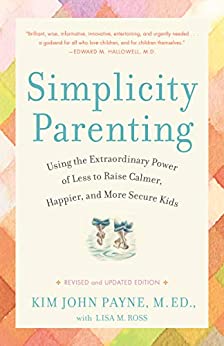More on this book
Community
Kindle Notes & Highlights
Read between
August 16 - October 1, 2018
Until the age of six or seven, children are developmentally and psychologically unable to differentiate between reality and fantasy.17
In Failure to Connect, psychologist Jane Healy notes that kids who don’t start using computers until adolescence gain competency within months equal to that of children who’ve used them since they were toddlers.
It’s okay because you’ve been there, for her and with her, so consistently that she has internalized your support. That’s why she is ready. And why she is tough. That’s why you can let go.
However, when a child is able to explore from a foundation of loving connection and security—when trust wins—he gains the freedom to grow. Without high levels of cortisol he can regulate his emotions. Free of the stress-regress cycle, he is better able to learn.
Just as the flight attendant reminds parents to “secure your oxygen mask before you help your child with theirs,” parents need to relax in order to convey ease to their children.
In a noisy world, quiet attentiveness speaks louder than words, and it gives a child more space for their own thoughts and feelings to develop.
Yet despite their questions and curiosity, children need boundaries to feel secure and free. They need to know, and to be reminded, that some things are for adults to discuss; they are not for kids to hear, or to comment on. Children need to see your self-restraint, your confidence in meeting your own world. With security and freedom they can begin to find their own inner voice.
our adult anxieties and concerns should not be the atmosphere, a haze of too much information, that they breathe. Children need to know that theirs is a good world.
parent’s words can help shape the way a child sees the world, and, most important, sees themselves.
if your kids grow accustomed to a “noisy norm” they will always try to create and maintain that level of clamor.
And for one person to really get a break, to really let go of a task mentally and physically, the other must do it consistently, with no need for requests or reminders.
Until the age of ten or so, their emotional consciousness and vocabulary are too premature to stand up to what we ask of them in our emotional monitoring and hovering.
A GPS system of the heart, emotional intelligence is what we strive for in our own lives, and what we want for our children.
Only with less can a child learn what it is that they do like, and what speaks to them. When their expectations are always met—even anticipated—their will is left flaccid and weak.


